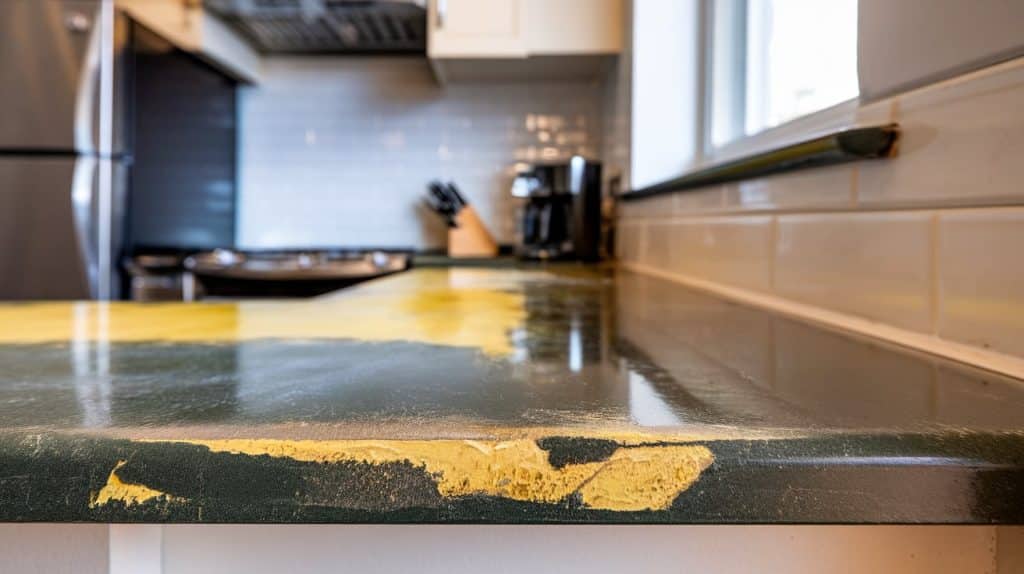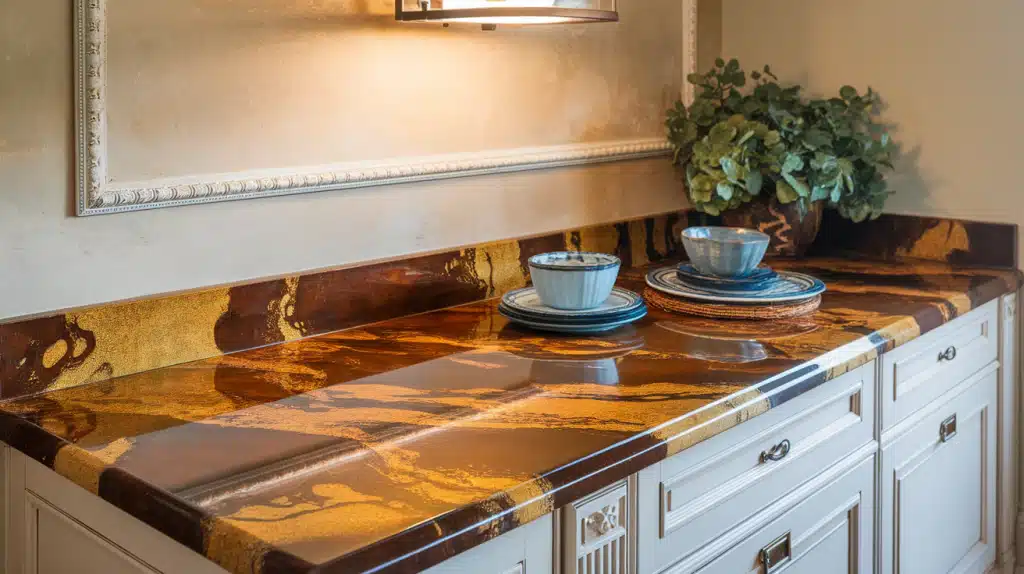Tired of outdated countertops but worried about the cost of a complete kitchen renovation? You’re not alone. Many homeowners face the same dilemma: wanting beautiful countertops without breaking the bank.
Epoxy countertops might be the solution you’ve been searching for. These affordable surfaces can change your kitchen or bathroom in just a weekend, providing you with a high-end look for a fraction of the price of granite or quartz.
However, before you rush to buy an epoxy kit, you need to consider the whole picture. While epoxy offers a stunning visual appeal and budget-friendly installation, it also comes with some serious drawbacks that could ultimately cost you more.
This guide will show you precisely what epoxy countertops can and cannot do, helping you decide if they’re right for your home and lifestyle.
What Are Epoxy Countertops?
Epoxy resin countertops are surfaces made from a two-part chemical mixture that hardens into a durable, glossy finish. The process involves mixing epoxy resin with a hardening agent and then pouring it over existing countertops or substrates to create a smooth, waterproof surface.
Epoxy kitchen countertops are popular in homes, bathrooms, and commercial spaces because they can mimic the appearance of expensive materials like granite or marble at a fraction of the cost.
Epoxy Countertops Pros
Epoxy countertops are a favorite among homeowners seeking a high-end look without the high price tag.
Known for their glossy finish and limitless design options, they offer a smooth, seamless surface that can mimic the look of stone, marble, or even bold, artistic patterns.
1. High-Gloss Finish and Visual Appeal
Epoxy countertops deliver a mirror-like shine that instantly brightens any space. The glossy surface reflects light beautifully, making kitchens and bathrooms appear larger and more open.
This polished look rivals that of expensive stone materials but costs significantly less. The smooth finish feels luxurious under your hands, creating a modern and upscale appearance.
2. Customization Options
You can create almost any color combination or pattern with epoxy resin. Popular choices include solid colors, metallic swirls, and realistic stone patterns.
Many homeowners choose faux marble or granite looks that fool even close inspection. The flexibility allows you to match existing decor or create bold, statement pieces that reflect your style.
3. Seamless Surface
Epoxy forms one continuous surface without joints, cracks, or grout lines. This means no spots for dirt, bacteria, or moisture to hide and grow.
Cleaning becomes much easier since there are no crevices to scrub. The seamless design also creates a sleek, professional appearance that flows smoothly across your entire counter space.
4. Heat and Moisture Resistance
Properly cured epoxy withstands everyday kitchen heat, such as from hot pans and dishes. It also resists water damage, making it ideal for bathrooms and kitchens, where spills are often a common occurrence.
The non-porous surface prevents staining from coffee, wine, or other liquids. This durability means your countertops maintain their appearance through daily use and occasional accidents.
5. Food-Safe When Cured Properly
Once fully cured, epoxy creates a safe surface for food preparation and dining. The hardened resin forms a protective barrier that won’t leach chemicals into your food.
Professional-grade epoxy meets food safety standards used in restaurants and commercial kitchens. This makes epoxy countertops suitable for busy family kitchens where food safety is a top priority.
Epoxy Countertops Cons

Understand the downsides of epoxy countertops, including wear issues and maintenance challenges, before making your decision.
1. Prone to Scratches and Chipping
Sharp knives and heavy objects can easily scratch epoxy surfaces during daily use. The glossy finish shows every mark, making minor scratches obvious under kitchen lighting.
Dropped dishes or cookware can chip the edges, creating rough spots that catch dirt and debris. These surface damages often require professional repair or complete refinishing to restore the original appearance.
2. Requires Skilled Application
Getting perfect results with epoxy demands precise mixing ratios and proper application techniques. DIY attempts often result in bubbles, uneven surfaces, or poor adhesion that fails within months.
Temperature and humidity during application significantly impact curing, making timing critical for successful results. Most homeowners find professional installation worth the extra cost to avoid costly mistakes and do-overs.
3. Yellowing Over Time
Direct sunlight and UV exposure cause epoxy to yellow and lose its clear appearance. This problem is especially noticeable with white or light-colored countertops near windows.
The yellowing process is gradual but permanent, affecting the overall look of your kitchen. Some newer epoxy formulas resist UV better, but most standard products will show this aging effect.
4. Repair Challenges
Repairing damaged epoxy countertops involves matching colors and blending the repair areas with the existing surfaces. Minor chips or scratches often need complete section refinishing to look right.
The repair process involves sanding, cleaning, and reapplying epoxy layers with precise timing. Many repairs are visible even when done professionally, making replacement the better long-term solution.
5. Shorter Lifespan Than Quartz or Marble
Most epoxy countertops last 5-10 years with regular use, while quartz and marble can last decades. The surface gradually loses its shine and develops more scratches over time.
Heavy-use kitchens may need replacement sooner due to wear and damage. This shorter lifespan results in higher long-term costs, despite the lower initial investment compared to stone materials.
Which Countertop Is Best? Epoxy vs Popular Alternatives
A side-by-side comparison of durability, cost, style, and maintenance to help you choose the right countertop material
| Feature | Epoxy | Ceramic | Quartz | Marble |
|---|---|---|---|---|
| Durability | Fair – prone to scratches | Fair tiles may crack | Excellent – highly durable | Moderate – chips, etches easily |
| Cost | $40–$100/sq ft | $10–$50/sq ft | $70–$150/sq ft | $75–$200/sq ft |
| Looks | Highly customizable | Basic tile styles | Sleek, uniform designs | Unique, natural veining |
| Maintenance | Moderate – can stain/yellow | High–grout upkeep needed | Low–stain & scratch resistant | High needs regular sealing |
| DIY Friendly | Medium – tricky to apply well | High – great for DIY | Low–pro install only | Low–pro install only |
| Lifespan | 5–10 years | 10–20 years | 20+ years | 20+ years (with care) |
Who Should Choose Epoxy Countertops?
Epoxy countertops are ideal for budget-conscious homeowners undertaking quick remodels, landlords updating rental properties, and DIY enthusiasts who enjoy hands-on projects.
They’re perfect when you want a fresh look without the high cost of stone materials or need a temporary solution before a major renovation.
However, avoid epoxy if you’re planning a forever home, cook frequently with heavy equipment, or want countertops that increase your home’s resale value. In these cases, quartz or granite offers better long-term investment returns despite higher upfront costs.
Summing It Up
Epoxy countertops offer an affordable way to update your kitchen or bathroom, but they may not be the right choice for everyone.
The glossy finish and customization options can give you that high-end look for much less money than stone materials. However, the shorter lifespan, scratch sensitivity, and potential yellowing mean you’ll likely need replacement within 5-10 years.
So what’s the bottom line? Choose epoxy if you’re working with a tight budget, updating a rental property, or want a temporary fix before a major renovation.
Skip epoxy if you’re planning to stay in your home long-term or need countertops that add real value to your property.
Ready to make your decision? Consider your budget, timeline, and long-term plans. Remember, the cheapest option upfront may not always be the best value over time. What matters most for your specific situation?
Frequently Asked Questions
How Much Does It Cost to Epoxy Countertops?
DIY epoxy kits cost $50-$200 for average countertops, while professional installation ranges from $3 to $8 per square foot.
What Is the Downside of Epoxy Countertops?
Epoxy scratches easily, yellows over time, requires skilled application, and typically lasts only 5-10 years compared to decades for stone.
Is Epoxy Cheaper than Granite?
Yes, epoxy costs 70-80% less than granite initially, but granite lasts much longer and adds more value to your home.
Can you Put a Hot Pan on Epoxy Countertops?
Brief contact with hot pans is usually fine, but prolonged heat exposure can damage or discolor the epoxy surface.

